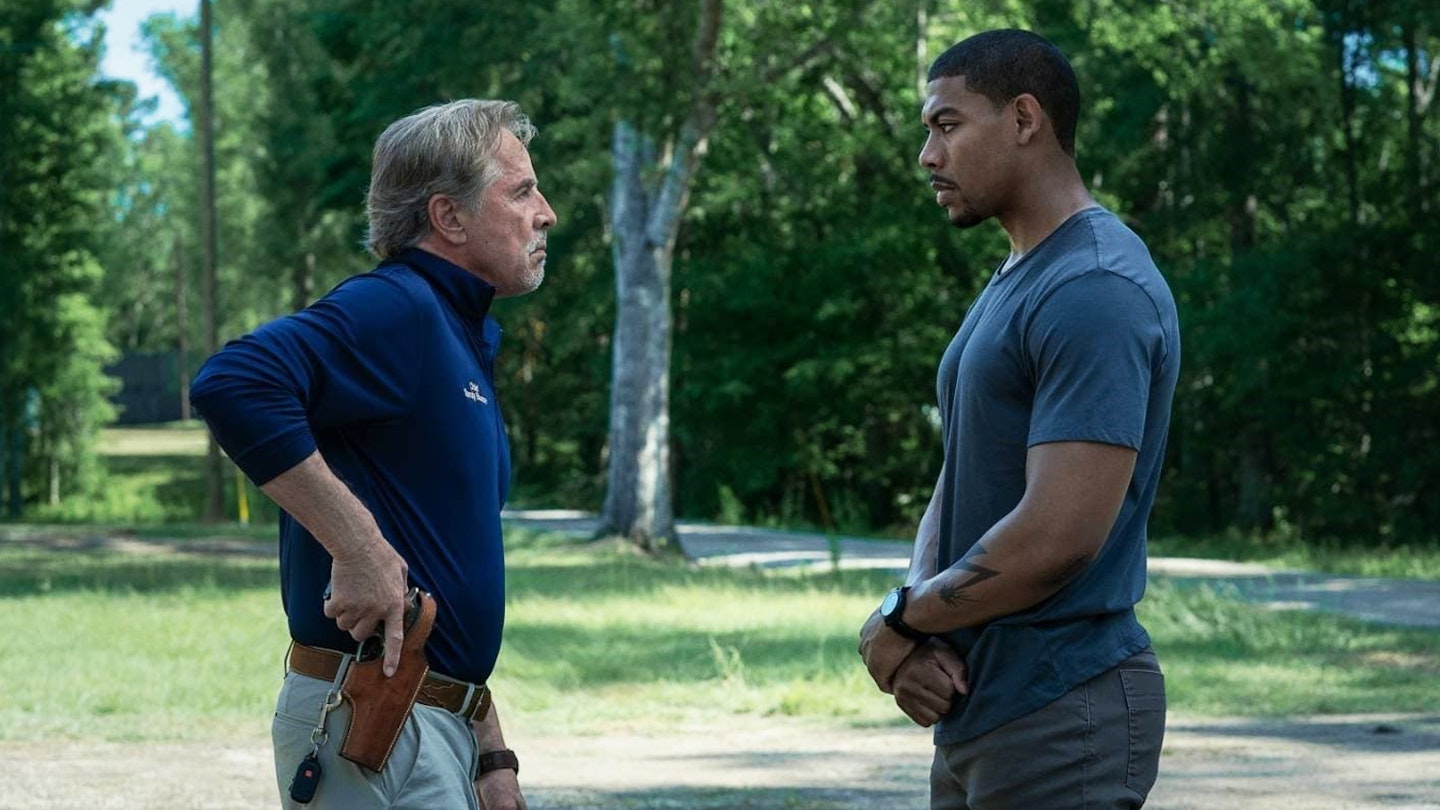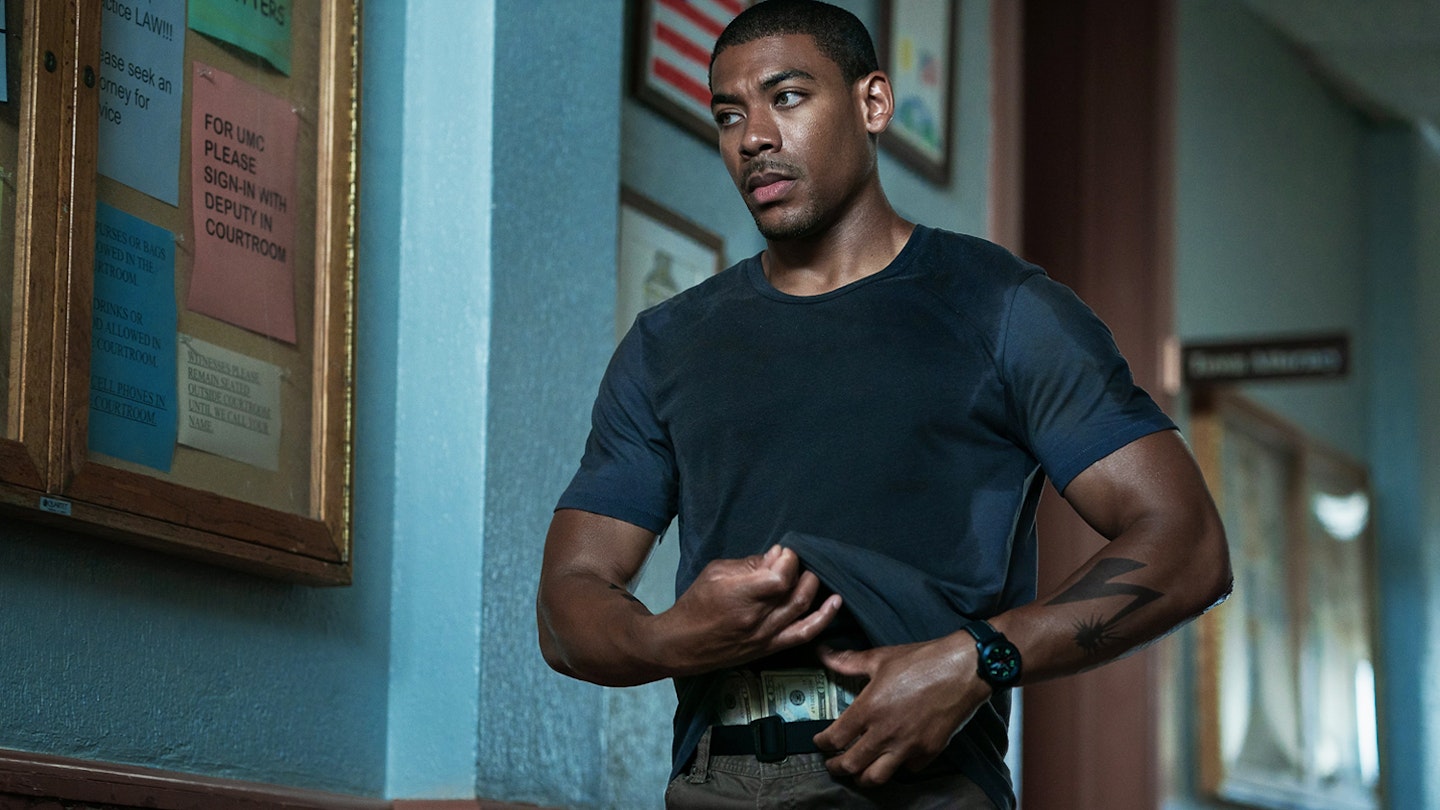Blue Ruin and Green Room writer/director Jeremy Saulnier opts not to complete his own three-colour trilogy with Rebel Ridge (‘Red Ridge’ was right there), instead saddling this engaging 21st century riff on First Blood with a banal title that doesn’t do it justice. For Saulnier, though, it must be quite a relief just to get this Netflix project out the door, after the 2020 production was waylaid first by Covid and then by the sudden departure of original star John Boyega. Happily, Aaron Pierre proves a more than capable replacement, shrugging into the skin of a former Marine and enthusiastic cyclist who finds himself firmly at odds with a small-town police department.

After being rammed off his bike by a patrol car for cycling while Black in the Louisiana town of Shelby Springs, Richmond (Pierre) is subjected to a legal if ethically dubious search and seizure, which sees the cops confiscate the 36 grand he’s scraped together to bail out his cousin and start a new life. Understandably unwilling to just walk away (something the law seems maddeningly set up to encourage), he seeks recourse first from court, then from the local police chief (Don Johnson, wielding a shit-eating grin), only to discover that some forms of corruption enjoy full protection under the law. Finding some sympathy in similarly downtrodden court clerk Summer McBride (former young Carrie Bradshaw AnnaSophia Robb), Richmond decides to dig a little deeper and find out just how deep the rot in this town goes.
If all you’re looking for from Rebel Ridge is a cathartic tale of one wronged man beating the ever-loving shit out of an assortment of dirty cops, then the film has you covered. As you’d imagine from a re-dressed Western, the stranger who saunters into town here is not a man without means — the scene in which Emory Cohen’s unbearably smug patrolman belatedly discovers exactly what Richmond did in the Marines is particularly satisfying. But Saulnier’s one-man-against-the-system tale proves a rather more subtle beast than its vigilante set-up might suggest. What begins as an obvious nod towards institutional racism quickly gives way to a very topical exploration of the many legal ways that American law enforcement can abuse their power, weaponising asset seizures and using bureaucratic legal procedure as a shield against repercussions.
When Richmond finally snaps, the pay-off is suitably gratifying.
That what the police are doing isn’t even illegal (at least initially) makes the injustice here especially infuriating. This isn’t a case of a few bad apples, so much as the existence of an uncaring and uncompromising legal system that empowers institutions at the expense of individual rights. Police corruption, Saulnier suggests, is not only flourishing, but has become more sophisticated and far more insidious; calls to defund the police feel especially toothless when there are numerous ways in which an unscrupulous department can quite capably fund itself.
If that all sounds rather dry, then you’ll be pleased to know that Richmond’s solution to this non-criminal criminality is not to furiously bring about a class-action lawsuit, but rather, as you’d very much hope, to begin breaking bones and feeding people their teeth. When he finally snaps, as we’re absolutely desperate for him to do from about five minutes in, the pay-off is suitably gratifying. But even here, Saulnier opts not to take the obvious route. Pierre, whose throaty growl will bring voice to Barry Jenkins’ Mufasa later this year, is a pressure cooker of barely contained fury, clear eyes belying the danger that lurks beneath his impeccable manners and veneer of respect. But Richmond is no Rambo, and when he finally lets his beast off the leash, the result isn’t the bodycount you might expect. “De-escalation” is a term used repeatedly in Rebel Ridge, and Saulnier is determined to leave Richmond with the moral high ground, regardless of provocation.
None of which is to say the film lacks for action, and the set-pieces, while judiciously deployed, are artfully staged and fresh-feeling, despite the familiar genre beats. Saulnier knows well how to wring tension out of a stand-off and each nervy confrontation positively thrums with it. That tension can only last so long, however, and the film does lose momentum in the final third. At comfortably over two hours, this could have used as much restraint in its runtime as in its application of violence — a probable consequence of Saulnier’s Swiss-Army-knife-style multitasking as writer, director, producer and editor. But despite some uneven pacing and a largely predictable outcome, this is a satisfying, substantial genre piece that, despite its forgettable title, is well worth remembering.

